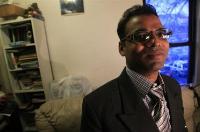
The routine, ordinary days of life pass by and accumulate without much notice. We commute through our days by the habitual byways. We do our work. We do our chores. We love our wives, our children, our families, and our friends. Most days pass by rather uneventfully; but, some days do not. And, on these days we might get a glimpse of who we really are. Mukul Asadujjaman, a New York City cab driver, recently had one of these rare days.

On Christmas Eve, Asadujjaman taxied Felicia Lettierri and relatives traveling with her from midtown Manhattan to Penn Station. Lettierri, a grandmother 72 years of age, was visiting family in New York and was returning to her home in Pompeii, Italy. Upon exiting at Penn Station, Lettierri forgot her purse inside the cab. Asadujjaman, besides being a taxi driver, is a medical student. And like most students, money is scarce for him. When discovering the purse Asadujjaman found “more than $21,000 of the group’s traveling money, jewelry worth thousands more, and some of their passports.” For someone working his or her way through medical school, $21,000 plus left in the back seat of a taxi cab may present a dilemma.
On Christmas Eve, Asadujjaman experienced one of those rare moments that lifts one out of mundane activity into a monumental period of self-revelation and self-definition. For one facing financial need, that substantial sum, if kept, could alleviate many worries. Even the police informed Lettierri that “they had little chance of recovering the lost goods.” But, Asadujjaman did not embrace this financial relief. Instead, he decided to attempt to return the lost goods to their owners.
Finding an address in the handbag, Asadujjaman borrowed a car from a friend and travelled 50 miles to Long Island with the hope of returning the money and belongings. Unfortunately, nobody was home when he arrived, but he left his phone number along with a note. Shortly thereafter Asadujjaman received a call and successfully returned the purse to Lettierri’s family. As one would expect, the family was ecstatic. They felt that Asadujjaman had “saved” the famly’s vacation, and said, “We really love what he did.” The family offered to give him a reward, but being a devout Muslim, he declined.
When asked if he was tempted to keep the lost belongings, Asadujjaman noted that the money would have allowed him to devote more time to his studies, but he said, “My heart said this is not good.” Furthermore, Asadujjaman credited his mother saying, “My mother is my inspiration. She always said to be honest and work hard.”
Through his actions on and following that Christmas Eve, Asadujjaman revealed his character and defined who he would be. In some respects, keeping the belongings would have been a boon for him: financial pressures would have been eased and studies would have been enhanced. For Felicia Lettierri and family, the reverse would have been true. For them, an aged grandmother would be facing a severe financial loss not likely to be recouped. Asadujjaman’s choice in this situation mattered. Whatever his choice, it would have reverberated through human lives like a late-night siren through a deserted street.
Asadujjaman’s virtuous action is a testament to his character. Yet, there is another subtle testament in his story. Asadujjaman acknowledged the role his mother played in the development of his virtue. Through the mother-son engagements that transpired in the routine, day-in-day out of life occasionally sprinkled by the particularly formative “special event,” Asadujjaman’s mother instilled in him a deep sense of honesty and hard work. Through the combination of Asadujjaman’s crisis moment and his mother’s steady teachings, it becomes clear that what we do matters and who we are matters, both in the monumental times and in the mundane.
Links
To read the BBC’s account of Mukul Asadujjaman’s story click here.
To read The Boston Globe‘s account click here.

